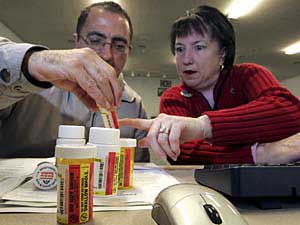|
Audio
Photos
More from MPR
|
Gov. Pawlenty issued the original order on Saturday, saying Minnesota will pay for the medicine for some of the poorest and sickest residents. While the federal government and retail pharmacists say the system is improving, others worry the state may be left paying for mistakes they didn't make.
St. Paul, Minn. — Gov. Pawlenty took the action so people like Susan Gray would continue to get her medicine. Gray is one of 95,000 Minnesotans who are eligible for both Medicare and Medicaid. Under Part D, she was supposed to have had her drug coverage transferred from Medicaid to Medicare on Jan. 1, 2006.
It wasn't that easy. Some beneficiaries were told to pay deductibles and co-pays they couldn't afford. Others, like Gray, weren't on Medicare's master list at all, and walked out of the pharmacy empty-handed.
"They wouldn't give them to me, and I was out. I suffer from severe depression among other things, and that's medicine that I need to take," Gray said. "And I felt very hopeless, and I called around to several different people that should be able to help me and couldn't."
Gray was able to get her medicine after calling the Minnesota Senior Linkage line. The governor's executive council agreed to extend Pawlenty's order for another month, so people like Gray will continue to get their medicine.
Human Services Commissioner Kevin Goodno says Minnesota has spent about $1 million processing 26,000 claims during the first three days since Pawlenty's order took effect. He says a minor glitch in the system became a major problem for people with many health care needs.
"If you're an individual who is disabled and elderly, and you take 12 medications a month, and you're not able to get them because you can't pay your $250, it's a life-threatening deal for them," said Goodno.
The Medicare Prescription Drug Benefit is the largest expansion in Medicare's 40-year history. Under the plan, 42 million disabled and elderly Americans are eligible to enroll in private plans that will subsidize their drug costs.
But the problems during the first few weeks of the program have angered seniors, politicians and pharmacists.
Early on, many pharmacists provided thousands of dollars in medicine to customers with the hopes that they'll be reimbursed at a later date. Julie Johnson with the Minnesota Pharmacists Association says Pawlenty's action has eased the concerns of many pharmacists.
"We don't want anybody to fall through the cracks, and we're doing our part and will continue to do our part. And the governor's recent activity with the extension will certainly help," said Johnson.
But others worry the problem isn't fully fixed, and could end up costing taxpayers a significant amount of money.
Dawn Simonson with the Metropolitan Area on Aging told the Senate Health and Human Services Budget Division that she thinks the glitches will be a nuisance for some time.
"I believe we'll continue to have people falling through the cracks for many months, as the Part D plan is implemented," said Simonson.
Sen. Linda Berglin, DFL-Minneapolis, says Gov. Pawlenty should call a special session if Simonson's fears come true. Berglin also wants the federal government to reimburse Minnesota for what it spends in drug costs for those who are on Part D.
"We should not be on the hook for any financial liability here. This is a federal program, and the federal government should make sure they make the states whole, and they should try to collect and make themselves whole," said Berglin.
But officials with the federal Centers for Medicare and Medicaid Services says it's the state's responsibility to collect its costs from the private insurers who administer the program.
Bob Herskovitz with CMS says the federal government will also work to ensure that states are reimbursed.
Herskovitz says he believes all of the computer problems will be fixed by the end of the week. Herskovitz also said the same thing last week. He says every action has been taken to ensure that no one walks out of a pharmacy without their medicine.
"We have enough contingency measures in place for the processes to work. We're expecting this to be fixed as rapidly as possible so that the contigency, which is working, doesn't have to be operable," said Herskovitz.
Herskovitz says, for the most part, the program is working well for many people. He says Medicare is providing one million prescriptions a day, and voluntary signup has exceeded expectations.





